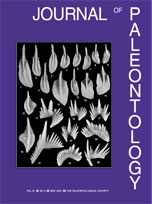Two new species of the rhynchonellid brachiopod Probolarina are described, Probolarina neoleonensis new species and Probolarina papalotensis new species. They were collected from a Paleocene limestone lens associated with a diapir in the La Popa basin, northeastern Mexico. Thousands of these brachiopods occur in this lens and constitute the first report of brachiopods for the Difunta Group, from which a diverse paleobiota has been previously reported. This occurrence represents the oldest record for the genus in the Western Hemisphere, as the only other Paleocene occurence of this genus was reported from New Zealand. Recent studies suggest that the carbonate lentil from which the brachiopods were collected were deposited in the shadow-effect area adjacent to the diapir, which affected the sediment influx into the basin.
How to translate text using browser tools
1 May 2007
NEW PALEOCENE RHYNCHONELLIDE BRACHIOPODS FROM THE POTRERILLOS FORMATION, NORTHEAST MEXICO
SUSAN L. KLOSTERMAN,
MICHAEL R. SANDY,
FRANCISCO J. VEGA,
KATHERINE A. GILES,
KYLE GRAF,
DAVID SHELLEY,
JESÚS SOLÉ
ACCESS THE FULL ARTICLE

Journal of Paleontology
Vol. 81 • No. 3
May 2007
Vol. 81 • No. 3
May 2007




